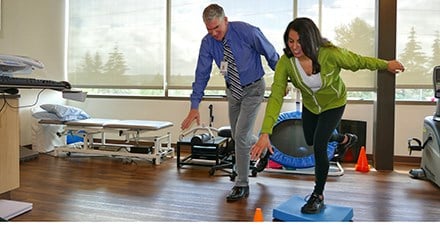Mandatory residency that integrates specialty certification? Staged licensure? Someday, physical therapist (PT) education could include any or all of those things, as education inevitably evolves to meet the needs of society, the profession, and the health care system.
But APTA will not be pursuing any of those paradigm-changing options right now.
That much is clear after APTA’s Board of Directors (Board) adopted multiple motions related to the pursuit of best practice in clinical education at their November meeting. The motions were the result of recommendations from a task force appointed to respond to a 2014 charge from APTA’s House of Delegates (House) to investigate the future of physical therapist education (RC 12-14 and RC 13-14).
The Board’s actions in November, which included amendments to the task force’s original recommendations, were the byproduct of months of extensive stakeholder engagement opportunities designed to generate feedback, including multiple in-person and virtual town halls, an online survey, and a collection of resources at APTA.org about the task force recommendations.
“What we heard loud and clear from our stakeholder engagement is that the profession isn’t convinced that a highly integrated system of staged licensure and clinical-and-residency education, as originally recommended by the task force, is in the profession’s and ultimately our patients’ best interest right now, and we responded to that feedback,” said APTA President Sharon Dunn, PT, PhD, board-certified orthopaedic clinical specialist.
“The task force recognized that some of their recommendations would mean massive changes that would take many years to implement, and it was always a priority to ensure that student debt wouldn’t increase as a result," Dunn explained. "Even so, there are too many unknowns in need of further investigation, and too many factors beyond APTA’s direct control, to commit right now to that kind of massive reform. But these conversations on advancing practice and education must continue in order to continue to meet our professional obligations to society.”
So what happens now?
Several things, but most simply and most significantly: the Board recommended that the Education Leadership Partnership (ELP) continue to explore the issues and concepts that were proposed as part of this multiyear exploration of PT education.
The ELP comprises representatives from APTA, the Education Section of APTA, and the American Council of Academic Physical Therapy (ACAPT). It was formed in 2016 to help reduce unwarranted variation in practice by focusing on best practices in education.
The Board recognized that the ELP is best positioned to pursue concepts identified by the task force, including:
- Inclusion of clinical education inquiry into the profession’s data management plan and prioritized education research agenda
- Development of a framework for formal partnerships between academic programs and clinical sites to include defined accountabilities for all parties
- Development of a structured PT clinical education curriculum that could include elements such as universal definitions for entry-level competencies, the enhancement of the residency and certification process to better complement the standard clinical education experience, and the development of standardized measurement tools to evaluate student competencies at all phases of education
- Creation of a long-term strategic plan for professional and postprofessional education informed by engagement with relevant stakeholders
The Board does not have authority over the ELP and thus cannot formally charge the ELP to take specific actions. But by adopting motions to forward various recommendations to the ELP, the Board is demonstrating its trust in that partnership.
“This whole process is a wonderful illustration of APTA’s ability to bring stakeholders together to examine our present and imagine our future,” Dunn said. “From the original member-generated motions in the House to the outstanding engagement around the task force recommendations, thousands of APTA members and nonmembers provided input that will inform the ELP’s ongoing efforts to achieve best practice in physical therapist education.”
